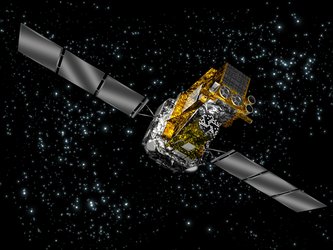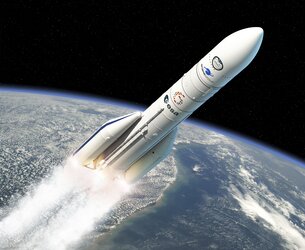Fly Your Thesis! 2021 campaign wrapped up
In brief
Over the last two weeks, the 77th ESA Parabolic Flight Campaign operated by Novespace took place in Bordeaux, France. A total of nine experiments were on board of the Airbus A310 AirZeroG, and three of them had been conceived by student teams in the framework of ESA Academy’s Fly Your Thesis! (FYT!) programme.
In-depth
A year has elapsed since the teams submitted their proposals. After this the FTY! Selection board validated the scientific value and feasibility of the proposals submitted by more than 30 teams. Team DZH Dynamics, LEOniDAS, and ZEUS made it through in the end. From that moment the teams worked hard to design, manufacture, assemble, and test their hardware. Being compliant to the safety requirements of Novespace is not trivial, as the experiments are to be operated on in proximity of scientists both hypergravity and microgravity conditions.

The objective of the DZH Dynamics team from the Carlos III university in Madrid and Imperial College in London was to explore use of the Dzhanibekov effect to make manoeuvres in satellites more energy and time efficient. The Dzhanibekov effect, also known as the tennis racket theorem, on its own is a fast, periodic, customizable, and energy-free 180-degree attitude change which rigid bodies experience (or not) depending on its inertial distribution (i.e., how the masses are distributed within the body). To control this the team designed an innovative smart inertial morphing engineering design. By utilizing three reaction wheels and a movable mass system, the team can change attitude and spin of their prototype. The campaign allowed them to capture the data they need to finetune their control system for microgravity operations.

Team LEOniDAS from Cranfield University attended the campaign to test the deployment of so-called drag sails, large surface area sails that are deployed at the end of the operational life of satellites in Low Earth Orbit to aid in speeding up the process of orbit decay through increased atmospheric drag. This project has a direct link with clean space goals to prevent inactive satellites from littering and colliding with other satellites or even the ISS (International Space Station). The team tested new deployment mechanisms in microgravity as well as the effect of deployment on the host satellite’s attitude during and after deployment by measuring the torque caused by the deployment.

ZEUS, a team of students from Glasgow University investigated control algorithms to detumble femto satellites, also called chipsats, in microgravity with the use of magnetorquers actuating in a well-defined magnetic environment. The team was challenged with the miniaturization of the satellite technology and the brief period before which these free-floating units collided with on the boundary of their experimental setup due to g-jitters.

Beyond the scientific and technical success, the campaign was an incubator full of strong emotions as people experienced weightlessness for the first time. One student from team LEOniDAS described the experience as “a year of character building and intensive skill development together with ESA Education and Novespace personnel ending in a once in a lifetime parabolic flight experience.”
Arrived safely in their respective countries with an unforgettable memories and hard drives full of data, the three teams are ready to gently come back down to Earth and tackle the data analysis. ESA Academy will follow each team for another 4 months until their final report is due in March 2022.
Fly Your Thesis! – an educational programme you will never forget
Part of the ESA Academy’s Hands-On Space projects, Fly Your Thesis! is a recurring programme that ESA Education sponsors on a yearly basis. During the FYT! programme, students receive valuable feedback from ESA, Novespace, and European Low Gravity Research Association (ELGRA) experts. In addition to all of this, they get the extraordinary opportunity to execute their experiments in microgravity conditions on-board a state-of-the-art vehicle like the Novespace Zero-G aircraft, right next to experiments and teams of professional researchers. The programme enables participants to develop important practical skills through hands-on activities, as well as project management, thus developing a considerable direct experience in designing, testing, and operating in laboratory and microgravity conditions their experiment hardware and software.
As a direct consequence of the research they conducted during past FYT! campaigns, many students have so far been able to present their results at international conferences and/or to publish papers in leading scientific journals. FYT! also provides opportunities to meet and work with experts. The experience gained is an important addition to students’ curriculum vitae and increases their chance of being elected for future professional opportunities.
Currently, ESA Academy and partners are reviewing the Fly Your Thesis! 2022 applications and will, in the next few weeks, select the teams to start the design and development of the new batch of experiments, and to fly in one year’s time.















 Germany
Germany
 Austria
Austria
 Belgium
Belgium
 Denmark
Denmark
 Spain
Spain
 Estonia
Estonia
 Finland
Finland
 France
France
 Greece
Greece
 Hungary
Hungary
 Ireland
Ireland
 Italy
Italy
 Luxembourg
Luxembourg
 Norway
Norway
 The Netherlands
The Netherlands
 Poland
Poland
 Portugal
Portugal
 Czechia
Czechia
 Romania
Romania
 United Kingdom
United Kingdom
 Slovenia
Slovenia
 Sweden
Sweden
 Switzerland
Switzerland
























